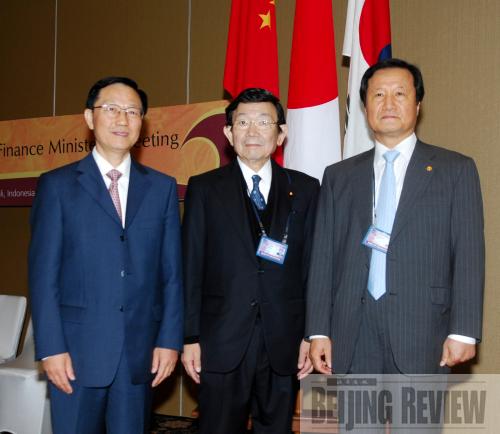|
 |
|
JOINING FORCES: The finance ministers of China, Japan and South Korea have reached agreements on the forex pooling arrangement and how much their countries will contribute (UE YUEWEI) |
The global economic downturn is exposing some serious cracks in the Asian financial landscape. A batch of crisis-stricken Asian countries from Cambodia to Malaysia are feeling the pain of waning foreign capital inflows, the collapse in equity market prices, a lack of dollar liquidity and, in some cases, depreciating currency. Though their financial woes do not appear acute enough to justify deep concern, East Asian countries have started flexing their collective financial muscles for self-rescue.
On the sidelines of the Asian Development Bank (ADB) annual meeting, finance ministers from China, Japan, South Korea and the 10 members of ASEAN (Association of Southeast Asian Nations) announced on May 3 their plans to set up a $120-billion foreign exchange liquidity fund by the end of this year to provide a regional backstop against the credit contagion. The fund will offer a contingency credit line should any of the member countries come under speculative attack, as they did in the 1997 Asian financial crisis.
 |
|
ECONOMIC INTEGRATION: Economists believe the regional liquidity fund is set to tighten economic ties between East Asian countries (YEON-JE) | According to the announcement, Japan and China will each contribute 32 percent of the funding while South Korea will contribute 16 percent. The rest will come from the 10 ASEAN countries. Under the terms of the scheme, smaller Asian economies are allowed to borrow larger amounts of money in proportion to their contributions than the more developed ones.
Moreover, the fund will also come up with an independent surveillance organization with the help of the ADB and the ASEAN Secretariat as soon as possible to monitor economies in the region.
The forex pooling program is the first and strongest such financial alliance to be launched and managed by the region to fight off the deepening gloom. It is part of the Chiang Mai Initiative, which encourages bilateral currency swap arrangements among the 13 countries. In May 2008, finance ministers agreed to strengthen the loose currency swap network by building an $80-billion forex reservoir to support member countries saddled with short-term liquidity shortages. In February 2009, they decided to increase the funding to $160 billion as the financial distress intensified.
Glimmer of hope
Despite having avoided following the Western world into the abyss of recession, emerging Asian economies are reeling from a freefall in demand for their toys, electronics and other exports. The ripple effect has triggered widespread investment stagnation, factory closures and painful layoffs. The World Bank even forecast that emerging East Asian countries, excluding China, will see a minimum 1.2-percent GDP growth in 2009, reflecting the worse-than-expected unfolding of the financial crisis.
Economists believe that the liquidity fund will provide a floor under the buckling East Asian economies while they get back on their feet. At the very least, it has sent out a strong signal that Asia is well positioned to ward off a repeat of the financial crisis that gripped the region a decade ago, they said.
Zhao Changhui, a senior economist with the Export-Import Bank of China (China EXIM Bank), told Beijing Review that the arrangement will deliver a boost to the region's financial resilience as liquidity risks loom large. By participating in the fund, China can also play a bigger role in regional revitalization efforts and decision-making in East Asian economic affairs, he added.
|
